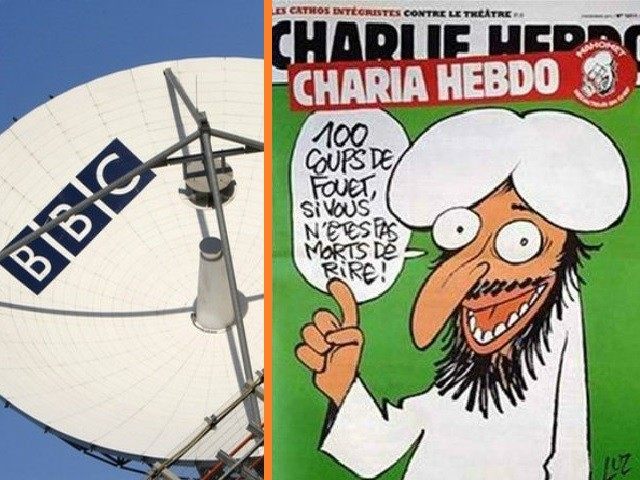The truth is out there when it comes to naming terrorists for what they are. Really, it is. Unfortunately a whole lot of people and news organisations would rather you didn’t know it. Tarik Kafala, the head of BBC Arabic, is one who prefers obfuscation over clarity.
He believes the term “terrorist” is just too “loaded” to characterise the two machine gun-toting jihadis who committed their act of blood-filled retribution on the staff of Charlie Hebdo. You know, the same pair who cried “We have avenged the Prophet Muhammad” after they turned the satirical magazine’s newsroom into a bloody charnel house.
Mr Kafala, who is in charge of the BBC’s largest non-English language service, has instead chosen the increasingly well-trodden road of submission. Breitbart London reported on his comments: “We try to avoid describing anyone as a terrorist or an act as being terrorist.
“What we try to do is to say that ‘two men killed 12 people in an attack on the office of a satirical magazine’.
“That’s enough, we know what that means and what it is.”
Mr Kafala then warmed to his progressive theme.
“Terrorism is such a loaded word. The UN has been struggling for more than a decade to define the word and they can’t. It is very difficult to. We know what political violence is, we know what murder, bombings and shootings are and we describe them. That’s much more revealing, we believe, than using a word like terrorist which people will see as value-laden.”
The BBC has company when it comes to reflexive liberal bias. US President Barack Obama would seemingly prefer to set his own hair on fire before uttering the word “terrorist.” He couldn’t say it after the 2012 attacks on the US Consulate in Benghazi, Libya and he couldn’t say it after the Kouachi brothers went on their killing spree.
The BBC and Obama share the same approach: if you don’t call something or somebody by name then it /they will hopefully go away.
As if that is going to happen anytime soon. Radical Islamist terrorists certainly won’t be in retreat as long as the people at Al Jazeera English bend over backwards to ensure that being economical with the truth is a critical part of their business plan.
On Tuesday the National Review Online in the US published a leaked memo written by Al Jazeera news executive Carlos Van Meek. It gives great insight into the mentality of those who work for the Qatar-based service. It reads:
All: We manage our words carefully around here. So I’d like to bring to your attention some key words that have a tendency of tripping us up. This is straight out of our Style Guide. All media outlets have one of those. So do we. If you’d like to amend, change, tweak.. pls write to Dan Hawaleshka direct who is compiling the updates to the Style Guide and they will be considered based on merit. No mass replies to this email, pls.
EXTREMIST – Do not use. Avoid characterizing people. Often their actions do the work for the viewer. Could write ‘violent group’ if we’re reporting on Boko Haram agreeing to negotiate with the government. In other words, reporting on a violent group that’s in the news for a non-violent reason.
TERRORISM/TERRORISTS – One person’s terrorist is another’s freedom fighter. We will not use these terms unless attributed to a source/person.
ISLAMIST – Do not use. We will continue to describe groups and individuals, by talking about their previous actions and current aims to give viewers the context they require, rather than use a simplistic label.
NOTE: Naturally many of our guests will use the word Islamist in the course of their answers. It is absolutely fine to include these answers in our output. There is no blanket ban on the word.
JIHAD – Do not use the Arabic term. Strictly speaking, jihad means an inner spiritual struggle, not a holy war. It is not by tradition a negative term. It also means the struggle to defend Islam against things challenging it. Again, an Arabic term that we do not use.
FIGHTERS – We do not use words such as militants, radicals, insurgents. We will stick with fighters. However, these terms are allowed when quoting other people using them.
MILITANT – We can use this term to describe individuals who favour confrontational or violent methods in support of a political or social cause. For example, we can use the term to describe Norwegian mass-killer Andres Behring Breivik or Oklahoma City bomber Timothy McVeigh. But please note: we will not use it to describe a group of people, as in ‘militants’ or ‘militant groups’ etc
There you have it. We are involved with a form of terrorism that knows no name committed by freedom fighters who have no known common cause.
Trouble is, facts do not cease to exist because they are ignored. Aldous Huxley said that in 1927.
Now we are having to shout it for the benefit of the wilfully deaf.

COMMENTS
Please let us know if you're having issues with commenting.